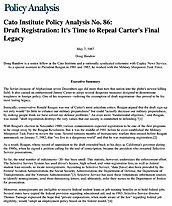The Soviet invasion of Afghanistan seven Decembers ago did more than turn that nation into the globe’s newest killing field. It also caused an embarrassed Jimmy Carter to adopt several desperate measures designed to demonstrate toughness in foreign policy. One of his responses–ordering the resumption of draft registration–has proved to be his most lasting legacy.
Ironically, conservative Ronald Reagan was one of Carter’s most articulate critics. Reagan argued that the draft sign-up not only would “do little to enhance our military preparedness” but could “actually decrease our military preparedness, by making people think we have solved our defense problems.” An even more “fundamental objection,” said Reagan, was moral: “draft registration destroys the very values that our society is committed to defending.”[1]
With Reagan’s election in November 1980, various commentators expected registration to be one of the first programs to be swept away by the Reagan Revolution. But it was the middle of 1981 before he even established the Military Manpower Task Force to review the issue. Several tortuous months of bureaucratic warfare then ensued before Reagan announced, on January 7, 1982, that “we live in a dangerous world” and that he was maintaining registration.[2]
As a result, Reagan, whose record of opposition to the draft extended back to his days as California’s governor during the 1960s, when he signed a petition calling for the end of conscription, became the president who restarted Selective Service prosecutions.
So far, the total number of indictments–20–has been small. This statistic, however, understates the enforcement effort. The Selective Service System has used driver’s license, high school, and voter registration lists, as well as federal student loan records, to locate nonregistrants. According to Selective Service, “data [have] also been provided by the Federal Aviation Administration, the Social Security Administration, the Department of Defense, the Department of Transportation, and the Veterans Administration.”[3] Selective Service has used these voluminous information sources to identify nonregistrants, send them threatening letters, and, ultimately, refer their names to the Department of Justice for prosecution.
Moreover, nonregistrants are ineligible to receive federal student loans or job-training benefits or to hold federal jobs. Several states have copied the federal provision regarding educational aid, and in 1985, Selective Service director Thomas Turnage expressed the hope that “private corporations, when made aware of the law” regarding federal job eligibility, would “adopt an employment policy based on the federal model.”[4]
This ongoing campaign of intimidation is all the more disturbing because there is no justification for retaining the increasingly costly and intrusive draft registration program. Mandatory peacetime registration, along with the government’s ever-more-draconian enforcement practices, is not only inconsistent with Reagan’s professed political philosophy; for the very reasons once cited by Reagan, it also fails to advance America’s security.
Finally, even if a special pool of manpower was needed for immediate induction in the event of a national emergency, it could be raised through a voluntary program–one consistent with what Reagan termed the “values that our society is committed to defending.” Today’s pool of 15 million registrants could be replaced by a Reserve Volunteer Force with barely 1 percent as many members, which would better ensure the availability of the untrained manpower needed to fill the army’s training camps during a large-scale mobilization.

This work is licensed under a Creative Commons Attribution-NonCommercial-ShareAlike 4.0 International License.

